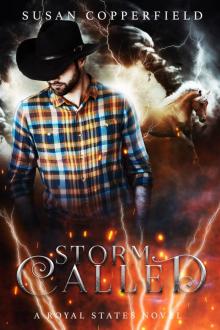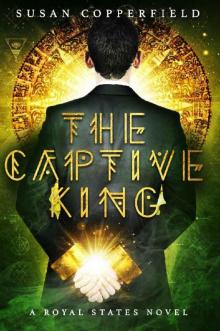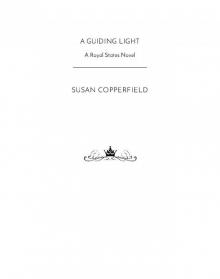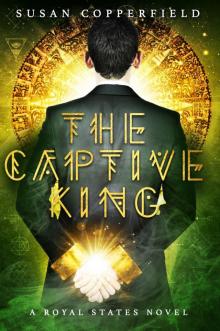- Home
- Susan Copperfield
Cold Flame Page 4
Cold Flame Read online
Page 4
Unlike with his horse, he took hers over to the handler himself.
Love looked a lot like a man who valued what his future wife loved more than anything else, and I wondered if anyone else in the crowd noticed the little things.
I envied them and wondered how much would have changed in my life if my parents had ever treated us kids like he treated her—or if my parents had treated each other like he treated her.
While some old man, probably a preacher of some sort, if Illinois adhered to tradition, rambled on and on about the sanctity of marriage, I pondered escape routes; I only needed to stay long enough for the couple to be wed.
Next time someone issued me an invitation to an event, I’d say no. Probably. Hopefully.
“Relax,” Terry whispered in my ear. “Nobody is going to bite you.”
“Not even the lion, wolves, or wolverine—that is a wolverine, right? Or is it a badger?”
“He’s a wolverine. He’s Prince Kelvin’s cousin.”
“Why was he in the bridal party?”
“Princess Evangeline offends the delicate sensibilities of many royals, and she hasn’t made many friends. I think she’d appreciate you, as she did her fair share of skipping around the Royal States, although she did so legally.”
“I have trouble with following the rules.”
“I’m aware. It’s been interesting keeping track of you when I haven’t been able to use border records to help when I’ve lost your trail. I’ve been told I should have a long talk with you about stowing away on trains. Please don’t stow away on trains in the future.”
“I needed to cross a larger kingdom, and I was tired of walking.”
Terry sighed. “Why am I not surprised?”
“You’ve met me.”
After an eternity of rambling about the responsibilities of kings and queens, husbands and wives, and fathers and mothers, the preacher finally got to the part where he asked the audience if anyone had any objections.
The way I figured it, only an idiot with a death wish would piss off the Illinois royal family, who could probably eat anyone who objected to the union.
Everyone kept quiet.
Good. The pair would have enough trouble one day ruling a kingdom.
In what I considered to be an oddity, King Jacques of Nevada took the bride’s hand, gave Prince Kelvin a stern warning to treat his new wife well, tossed in a few threats about plucking him for his feathers if he stepped out of line, and gave his blessing for the union.
I found the whole thing ridiculous but sweet, and so did some of the wishy-washy princesses in the front rows, as someone started to sniffle. Unlike them, I didn’t take leave of my dignity or senses. Leaning towards Terry, I asked, “Who is crying and why?”
“That would likely be Prince Kelvin’s mother. She had a bit of a falling out with her son over his choice of bride.”
“Stupid,” I muttered.
“You’ll get used to it.”
Like hell I would. “Not a chance, Terry.”
“Says the woman who is interested in the lusty prince in the second row. Royals are falling in love left and right. You might catch the bug next.”
“I am fleeing from this wedding before anyone throws any damned flowers. The bouquet can hit me in the face for all I care, but I am not catching it.”
“What if the lusty prince in the second row catches the garter?”
“I am not planning on staying that long, Terry. Me being here is madness.”
“You belong here as much as anyone else.”
“You’re crazy.”
“We’re all mad here.”
I needed to notify Montana’s RPS they owed Terry a huge raise. “Well played. My name isn’t Alice, and this isn’t Wonderland.”
“If anything trips Prince Kelvin’s trigger, it may as well be Wonderland.”
Prince Kelvin’s eyes remained fully focused on Princess Evangeline, and if they didn’t stop looking at each other like they’d rather be somewhere private yesterday but preferably sooner, they’d embarrass themselves—or all of their guests. Or both. I put my bets on both.
The preacher cleared his throat in an effort to regain control of the wedding and get through the actual vows. To my relief, instead of a ten-minute monologue each, they’d gone with short, sweet, and to the point, promising to be loyal and loving to the end of their days.
Their expressions intrigued me. If I judged from Prince Kelvin’s face alone, everything he’d ever wanted in his life stood in front of him. Princess Evangeline, on the other hand, struggled to come to terms with someone loving her that much.
I understood her a lot more than I understood him.
They exchanged vows and rings, and I bit my knuckle so I wouldn’t giggle at how the bride snatched Prince Kelvin’s hand and shoved his ring into place as though afraid he’d change his mind or attempt to escape.
Prince Kelvin took his time and savored the moment.
For a bunch of people who were supposed to be dignified, the crowd cheered loud enough to give me a headache. The noise startled the bride, and if I ever found someone willing to put up with me for extended periods of time, I expected I’d look just like her: stunned anyone would care she’d found happiness.
She lasted about twenty seconds before she started to cry, which alarmed her new husband so much he, as warned, transformed into a silver and white turkey in an explosion of feathers.
I lost the war with myself and laughed at the chaos.
Four
Like hell my talent wasn’t suitable for California.
I escaped from the wedding while laughing so hard I cried right along with everyone else. I skipped the reception and left before anyone could notice I was there in the first place.
Terry seemed a little disappointed I hadn’t stuck around, but as promised, he dropped me off at the California border with instructions on how to contact him while he entered the kingdom in a more traditional manner.
If the refugee process went at all as I expected, he’d need a lot of luck to find me once I settled into the kingdom. He only had himself to blame for the work ahead of him.
He’d wanted a challenge.
I brought a single bag of clothes, wallet, and my unicorn figurine with me, which the border guards admired before allowing me to keep.
Then the tests began.
Instead of the traditional talent evaluations New York preferred to judge someone’s worth, all they cared about was if I could display any talent at all. I lit a match on fire and snuffed it out, which pleased the evaluator.
Nobody in California wanted a firestarter, but they appreciated anyone who might be able to help rein in a wildfire. I claimed I wasn’t sure how much help I could be with their wildfire problem, but if I could help, I would.
I, too, appreciated a challenge, and New York had an unfortunate tendency to refuse requests of aid from California during their wildfire seasons. I found the refusals selfish, greedy, and unreasonable.
For my parents and family, money mattered most, so in their eyes, helping a rival kingdom with a fire problem wouldn’t pay off for them.
I couldn’t even remember what talent the Californian royal family had, but it didn’t help much with their wildfire problem.
From start to finish, the tests took an entire week. I appreciated their method, as it walked each test taker through the fundamentals before easing into higher learning. According to the information pamphlet, most failed out of testing during day two or early into day three. That I’d lasted all the way to the final day meant a guaranteed admittance into the kingdom.
Doing what, I had no idea, but I didn’t care. It didn’t matter.
I enjoyed several days of waiting for the results to come in along with information on where I’d be living, what I’d be doing, and what the rest of my life would look like.
My advisor, an old woman who’d seen everything and then some during her day, swept into the waiting area I’d spent most of my time in w
hen not taking tests and waggled her finger for me to join her. I thought her name was Jolie, but she preferred to keep her relationships with everyone to ma’am or sir without humans being involved in the immigration process. My bag, which I never let out of my sight, came along for the ride.
She scowled, as though my bag somehow insulted her delicate sensibilities. Was it not fancy enough for her? I thought I’d done well picking the best the thrift store had to offer.
She led me to one of the private and cramped interview rooms and gestured for me to sit down. “You passed.”
No shit I’d passed. I’d gotten through all seven days of testing without being ejected for scoring too low. As I’d sworn I wouldn’t act like a bitchy royal on the loose, I forced a smile and said, “Thank you.”
“We have been discussing what to do with you. It’s unusual to get refugee candidates who survive through all seven days of testing. Your magical aptitude is unsuitable for work here, so we need to place you somewhere you’ll be useful.”
Like hell my talent wasn’t suitable for California. The first time a wildfire crossed my path, I fully intended to make it my bitch just to prove the old lady wrong. I didn’t even need her to know I’d done it; satisfaction I’d done what she said I couldn’t would be sufficient. “That’s unfortunate.”
“We don’t like flameweavers here in California.”
Maybe that had something to with my parents’ refusal to help the other kingdom out. They didn’t like lifting a finger for anyone who didn’t trip over their feet trying to worship them.
“That’s unfortunate.” I considered showing off and lowering the temperature of the room to an uncomfortable level for acting all snooty. “I had been asked to demonstrate I had a talent. That was all. I was unaware that the talent would influence my application.”
“Flameweavers cause wildfires.”
“As do car accidents, children with illegal fireworks, campfires, electric companies with faulty wires, and drought conditions. I have full control over any fires I create. Perhaps California would do better to properly train their flameweavers rather than automatically blame them for environmental factors outside of their control. There are no proven ties linking flameweavers and wildfires; making such a claim to intimidate a refugee, who can choose to just leave the kingdom and advertise the prejudice in front of a truth seer, isn’t the wisest way to handle the situation. If California is having a trouble with poorly trained flameweavers, perhaps you should be making efforts to hire those capable of training them appropriately. A properly trained flameweaver can extinguish fires as easily as they can create them.” I kept my smile fixed in place. “Ma’am.”
She narrowed her eyes. “I see you can, when you choose, be assertive.”
“If the situation requires it, yes. I can be.”
“While California does have flameweavers working in fire management, there aren’t any openings at the moment. The best opening I can get you is in San Francisco, but it won’t be available for at least three months; one of the section librarians is retiring, and you may be a suitable candidate for that role.”
Never in my entire life had I ever considered working at a library, although I had to admit the idea appealed. I liked books. I liked putting books back where they belonged. Thanks to my incessant drive to be a walking know-it-all, I often knew where things were located in books.
Working as a librarian made sense—except I had no idea what librarians actually did. “I don’t think I’m suitably trained to be a librarian.”
“That’s a concern, as the job would be in the California Royal Archive. You would have to be trained.”
“Is it possible to train someone how to be a librarian in three months?”
“Not particularly, which is where the problem is.”
“Why not just put me somewhere I’m qualified to work? I didn’t come here to have a cream of the crop job. I came here to have a place to stay and a job. I don’t really have to like that job, do I?”
“We’ve found refugees have an easier time adapting when they are given challenging work. There are assistant positions open in various public libraries you can augment with part-time work elsewhere to supplement your income. You will have a full work permit conditional to doing your assigned hours at the jobs of California’s choosing. You will be issued an email account you will be required to check at least three times a week for any changes to your schedule. Public libraries can access the email system, so you will find this requirement easy to meet. You will be given a small stipend, an apartment for the first year you are here, and after that, you will be on your own outside of meeting your mandatory hour requirements.”
“And the mandatory hours end after five years?” I asked to confirm what I had read was true.
“That is correct.”
What was five years? I’d walked across more of the Royal States than I cared to think about. Staying in one place for a while appealed. Unless all hell broke loose—or they found out who I’d been before slipping into California as a refugee, I’d be safe enough.
Life would be interesting.
“All right. I’m not going to be picky about the work I’m assigned. If California wants to waste my education, that’s no fault of mine, right? I’m here, and that’s what matters to me at this point in time. I can look for better work after my five-year probation is over and I can apply for full citizenship.”
“If you decide you want citizenship.”
How had such a stupid woman been put in charge of refugee evaluations? “Why would I be willing to put up with five years of shit jobs just to quit after making it that far? And yes, that is what I’m expecting; I could’ve passed that test with a perfect score for all I know, but because I’m entering as a refugee, my prospects still wouldn’t be as good as someone born here. I came here knowing that.”
“You did score surprisingly well. There will be future testing options available for you as a result of your excellent placement scores.”
That caught my attention. “Future testing options? What do you mean?”
“Your status as a refugee doesn’t bar you from taking advancement testing for specialized positions, and should you test well and be accepted for one of these positions, they override your mandatory hour requirements. You’re eligible.”
I loved tests. Tests loved me. We had the perfect relationship. I would never betray a test through cheating, and tests existed to challenge me. I licked my lips. “How often do these tests pop up?”
“There are testing opportunities always available.”
I loved California. “What’s the catch?”
For the first time since meeting her, the woman actually smiled. “There’s no catch. You pay the testing fee, which is usually below thirty dollars per examination, and you take the test. Those with the best scores are invited to interview. That’s it. It’s a good way to expand your horizons. Some of our refugees have done very well for themselves through testing.”
I wondered about one thing, which would bother me until I asked. “What do you do about the refugees who are escaping poverty or other situations that don’t allow them to have higher education?”
The woman shook her head. “We have different programs for asylum seekers of that class; you’re a merit-based refugee. Asylum seekers from troubled locations are handled differently and are granted alternative opportunities, including education. It would be unfair to eliminate someone’s chances of a better life testing them on things they have no hope of knowing.”
I could live with that; New York wouldn’t have cared for anything other than wealth and strong magic, and my family would, without a doubt, find some way to twist it to their advantage.
My family needed a swift kick in the ass and someone with compassion to punt them out of New York and take over—without trashing New York’s financial stability in the process. Some things my family did right, and playing the market was one of them, although Illinois and California often proved to be st
iff competition.
I hadn’t done my due diligence after leaving; what use did I have for following news that no longer applied to me?
“That’s good,” I replied, and I meant it.
“Have you decided on a name for yourself yet?”
I’d been presented with a binder that would let me change my identity if I decided, and I’d asked for time to think it through; some things I wanted to keep. The rest could go. I’d stay Rachel. My family could take the Ambrose name and suck on it for all I cared. After playing a game of close my eyes, flip through pages, and smack a finger to the sheet, I’d drawn Modesto as my new last name. “Rachel Modesto.”
With the new name would come a new beginning, or so I hoped.
People, even people like me, needed a little hope to cling to. Maybe that’s what had destroyed my sister. She’d put her hopes in the wrong places, and she had let it destroy her.
While I would make mistakes, mine would be the harmless kind, the kind that hurt only me.
It wasn’t much, but I would make it enough.
Had I not been accustomed to a rough way of life, I might’ve found the studio apartment in Los Angeles oppressive at best. A few weeks in hotels had spoiled me on beds, but I liked the firm mattress. I liked having a space of my own. I liked the old, worn dresser. If it could speak, I bet it would have interesting stories to tell about the people who came and went from its domain. The bathroom would test my patience.
To conserve water, the shower barely got the job done. I had to hike three blocks to the laundry mat, which I would use out of a perverse need to experience life like everyone else in the apartment complex.
The first few days I’d been living among the other residents, I hadn’t understood any of their complaints, from a neglectful landlord to faulty hot water heaters to showers that barely worked.
Add in the family of rats that lived in the walls, and my life had taken a turn in the wrong direction. Killing one of the rats with my talent, an uncontrolled flare spurred by fright, reminded me I needed to control the fiery beast within or run risk of going out in a blaze of glory—and taking a lot of people out with me when I went.

 Cold Flame
Cold Flame Storm Called
Storm Called Bonds
Bonds Null and Void
Null and Void The Captive King_A Royal States Novel
The Captive King_A Royal States Novel Huntress
Huntress A Guiding Light
A Guiding Light The Captive King
The Captive King A Guiding Light_A Royal States Novel
A Guiding Light_A Royal States Novel